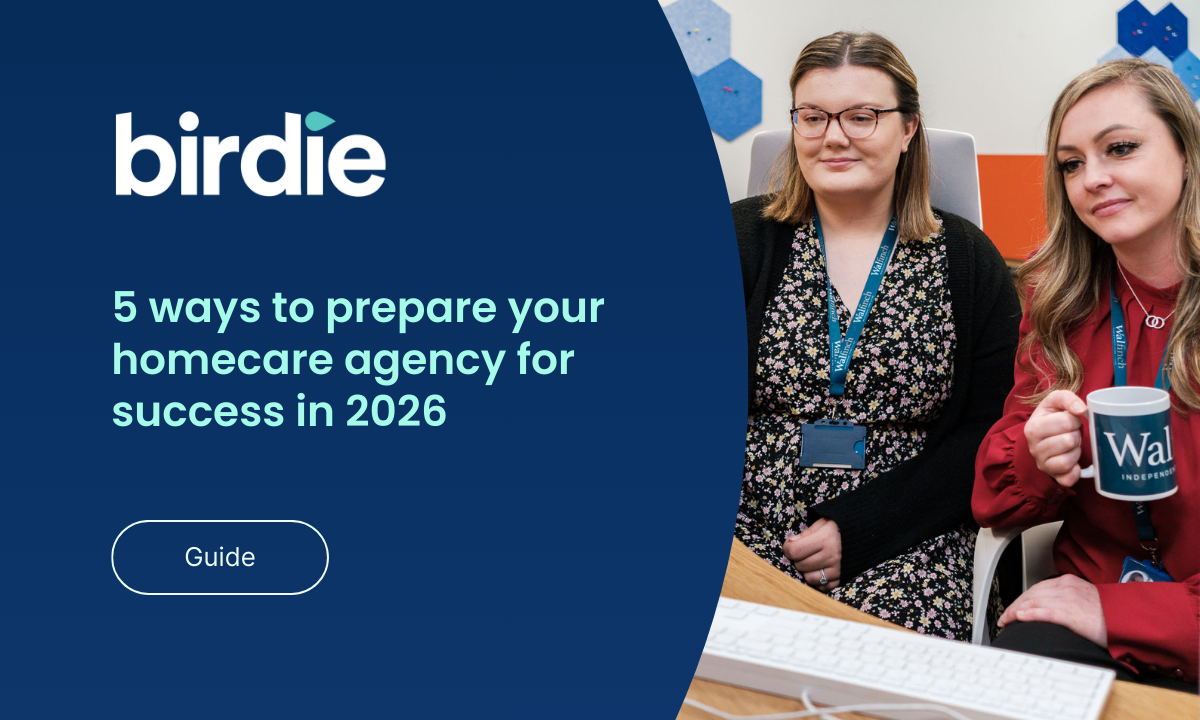Table of contents
The Birdie team recently had the privilege of interviewing Sarah Mullins, Director of Compliance and Safeguarding at Abicare. Abicare is an award-winning provider of homecare and live-in care throughout England and Wales, and has been a Birdie customer for several years. Here's what Sarah had to say about her journey into her role...
When I started in the care sector twenty-odd years ago, I never imagined I'd end up leading compliance for a multi-branch care organisation. Back then, I was in sales and had just been made redundant. With friends and family in the care industry encouraging me to give it a try, I went for an interview at what was then Milford House Home Care (now Abicare).
I walked in expecting to interview for a carer position and walked out with a coordinator role – but I made the decision to start as a carer anyway. I wanted to understand the frontline experience before moving into management, and that decision has shaped my entire approach to compliance.
Why we needed a dedicated compliance role
Over the years, I've worked my way through almost every role at Abicare – from carer to coordinator, rota clerk to registered manager, area manager to operations manager. In each position, I saw how compliance was constantly competing with day-to-day operations for attention. As much as we tried to keep on top of it, the firefighting would often take over.
That's why in June 2024, we made the decision to create a dedicated compliance role. The regulatory landscape has changed dramatically – everything is evidence-based now, and the requirements are more complex than ever. We needed someone who could step back from daily operations and look at the bigger picture.
How I approach the role
My first task was creating a three-month plan to structure this brand new role. I wanted to balance immediate needs with long-term improvements – though I quickly learned you can't do everything at once, no matter how tempting it might be!
I've structured my work around three key areas:
1. Policy management
I've spread policy reviews throughout the year rather than having them all due at once (imagine trying to review every policy by 1st April – impossible!). Each policy gets a thorough review, making sure it's not just compliant on paper but actually working in practice.
2. Quality monitoring
We're developing our first comprehensive internal audit process. I run regular compliance check-ins with teams, analyse trends across our branches, and make full use of digital tools like Birdie. Birdie’s Analytics component has a feature called the Q-Score, which was created in line with the CQC’s categories, and allows us to see a real-time projection of what our branches would achieve at inspection.
3. Safeguarding and complaints
I oversee all safeguarding concerns and complaints, looking for patterns that might help us prevent issues before they arise. It's not about finding fault – it's about learning and improving.
Creating a culture of openness
One of my core principles is that there should be no blame when things go wrong. I want staff to feel they can be completely honest about challenges they're facing. We're one team, with different departments ready to support when things get tough.
That's why I maintain an open-door policy and focus on building strong relationships across all levels. When someone raises a concern or admits to struggling with something, we treat it as an opportunity to learn and improve together.
Looking ahead
The new CQC framework brings fresh challenges, but that's natural when you're trying to improve something. We haven't had our first inspection under the new framework yet, but we're working to understand and implement the changes effectively.
What I do know is that compliance ratings still matter enormously. A 'requires improvement' rating can affect your ability to expand or secure local authority contracts. That's why having someone dedicated to maintaining standards is becoming increasingly important.
For others stepping into similar roles, I'd emphasise the importance of understanding the challenges at every level of the organisation. You need to balance immediate needs with long-term improvements, stay current with regulatory changes, and most importantly, remember that we're all working towards the same goal: providing quality care for our service users. Everything else – the policies, procedures, monitoring – it's all in service of that.
What started as a new role seven months ago has evolved into something essential for our organisation. As the care sector continues to evolve, I believe this kind of dedicated compliance oversight will become not just beneficial, but essential for maintaining high standards of care.
If - like Sarah - your role encompasses maintaining compliance standards, then Birdie can help you - our smart homecare technology puts quality first, so you can keep raising the bar, no matter how much your organisation grows. Have a look here for more information.
Published date:
February 18, 2025
Author:
Hannah Nakano Stewart

















.svg)